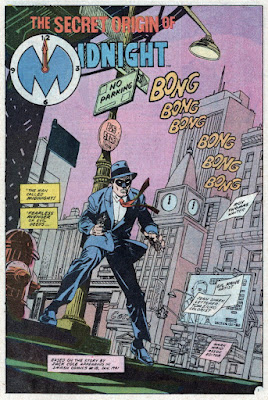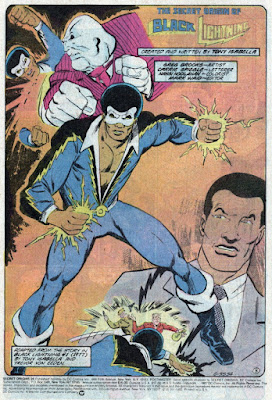In retrospect, it must've seemed like a good idea to DC Comics to publish a regular mag devoted to the 'secret origins' of its heroes - even though previous attempts at such a title had been short-lived. The difference this time was that the strips would be all new renditions as opposed to reprints of older tales in the '70s incarnation of the title (following two Specials in the '60s).
Only trouble is, most of DC's older characters are 'dead weight' and only the most serious and committed collectors would have the slightest interest in learning anything about them. There was a reason their origins were secret, that being the characters themselves were relatively unknown or forgotten to most modern day readers of the '80s.
I'm therefore surprised the new title lasted as long as it did - a whopping 50 issues, three Annuals and one Special. I've got them all, though whoever was supplying me with my comics back then neglected to put #29 aside for me and it took me more than a quarter of a century to eventually acquire it. Not that I was searching for it, as I was only reminded of its absence when I took a quick look at the other issues, and that wasn't very often.
I'm therefore embarrassed to admit I haven't read the majority of this series, as most issues aren't very appealing. Although competently drawn for the most part, the art is uninspiring in far too many instances, and the 'heroes' (a few exceptions aside) are mainly underwhelming. They just don't 'call' to me to read them and, consequently, I haven't.
However, I have a duty to fulfil with these cover & image gallery posts - I've started so I'll finish, even though it's now been over five and a half years since I first published part one. Trouble is, the comics are buried in a drawer of my filing cabinet, and I have to shift a pile of other mags in order to reach them to scan, which is quite a time-consuming process.
Anyway, enough excuses - here are another five issues for your personal perusal, leaving only another 20 comics to go 'til we reach the end of this series (plus three Annuals and one special). Aren't you excited? Well, probably not, going by the responses this series of posts receives. However, if you can muster the energy, feel free to leave a comment in the you-know-where.
 |
| Some lovely GIL KANE art in this one |















10 comments:
Why does MIDNIGHT look like Will Eisner's SPIRIT? Are all these Origin tales send-ups of other companies characters?
Nope, T47, none of them are 'send-ups' (which suggests 'parodies') - I guess Jack Cole just liked The Spirit's appearance and decided to appropriate the look. Nothing else is similar between the two characters.
Kid, why did you keep buying a comic you didn't like?
Well, I never actually said that I didn't like it, CJ, only that it was (more often than not) underwhelming. However, below are three answers to your question, of which you can take your pick.
1) The triumph of hope over experience.
2) The compulsive desire to have a complete set.
3) More money than sense.
Very nice Gil Kane art behind a really average cover, I will look out for that issue of I see it. I picked up a few of these back in the day but found them for the most part to be pretty poor stuff. I'll go with point 2 and 3 for your reasons for picking these up Kid 😁
As regards 3, McS - I've got LOADS of sense, so maybe I'm a millionaire. (Truth to tell, none of the three are mutually exclusive.)
I don't remember being aware of a DC Miss America- the only MA I knew of was the one married to the Whizzer at Marvel!
She was well before our time, DS. I don't think I was ever aware of her either. In fact, I'm still not, as I haven't read her 'secret' origin. (So it's still a secret.)
The first Miss America actually appeared at Quality Comics, for maybe half a dozen stories, before Quality dropped the character. About a year later, Timely started their own Miss America, who lasted, what, three-four years. If she'd never been revived I imagine fans would know her best from reprints of the All Winners Squad.
The first Miss America was, as Kid says, thoroughly underwhelming, in that she possesses very vague transformation powers, and I assume DC just claimed her as one of the many heroes they purchased from Quality. Originally I thought I heard that DC only bought the rights to Blackhawk, which they continued without missing a beat, and Plastic Man, whom the company sat on for ten years before dragging him out of mothballs. One fan-essay claimed that DC just forgot they had the rights to Plas, though I tend to think his wild and crazy ways would have clashed with their rep for safe, staid comics. Possibly the DC humor titles, which got a little crazier in the early sixties, loosened the company up enough for them to assign Arnold Drake to remold (heh) the first ductile detective.
Not that I care to research the matter, but I've always wondered if DC really has rights to all the secondary Quality heroes they claim, or if some vagueness in the original contract gave them "squatting rights," so that they could be sure no rival company picked up the properties. No modern company was ever likely to do anything with Miss America, though I suppose some enterprising independent might have had fun with Midnight. On the latter, the story I heard was that even though Quality publisher Busy Arnold had the rights to republish some or all of Eisner's "newspaper comic book" adventures of The Spirit, Arnold wanted to coast off the perceived popularity of the fedora-clad crimefighter and so had Cole put together Midnight, whose adventures tended to be daffier than The Spirit's. I'm not saying I think a revived Midnight would sell well, just that DC maintains a hold over these old war-horses to make sure no one else can use them.
Just the kind of detailed comment I like, GP, but am often incapable of making myself. Ta much for going to all that trouble. I think the Secret Origins series could've been better if they'd used more popular artists regularly, instead of the competent, professional, but uninspired ones they tended to use. Too many heroes of the run were 'of their time' and didn't really translate too well for a modern audience, who probably weren't the slightest bit interested in characters from World War II. Roy Thomas seems to love all that stuff, but most readers find it boring because of its '40s context.
Post a Comment